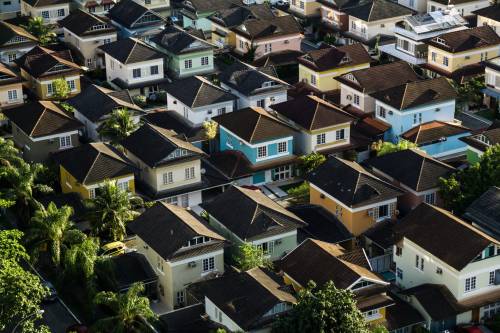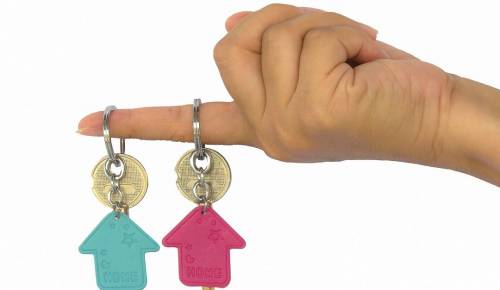Here’s What Industry Leaders Predict For Real Estate In 2021
From the Manhattan apartment and rent recovery to what will happen to inventory, we've compiled some projections for what the market holds for 2021. When the a
- by B2B Desk 2020-12-28 07:49:20
There is no doubt that 2020 has been a very active year for the real estate sector. From the temporary Covid-19 pause that halted deals and sales altogether, to the slow recovery and collapse of the apartment-saturated rental market in Manhattan, to hot markets in the metropolitan area's suburbs, there have been many ups and downs.
From the Manhattan apartment and rent recovery to what will happen to inventory, we've compiled some projections for what the market holds for 2021.
When the apartments recover
Eric Bennaim, CEO and founder of brokerage Modern Spaces in Queens, New York, says he expects to start seeing a rebound in the apartment market in the second quarter of 2021.
"Many developers have reduced rates during COVID, so buyers will now see an opportunity to buy 'value,'" says Benaim. "The Fed said it plans to hold current interest rates until 2023, which will also help."

Rent refund?
Andrew Barucas, CEO of New York City brokerage MNS, believes the New York City market will regain 50% of what it lost by the summer of 2021, although all experts say it depends on how many employees are back in the office and how many companies are hiring. New employees to work on site.
"It depends on 50% of the people returning to the office," says Barocas. "If 75% comes back, then the market will recover 75%. If it is 25%, the market will recover 25%. We have 20,000 vacant apartments now. It's just a question of supply and demand. There is a direct relationship with the rental market and people returning to offices and with trends. " Currently, I feel like 50% of people will be back in the summer of 2021. This is what makes New York, New York.
Jared Antin, a sales manager for Igran Brokerage in New York City, believes it will take at least 18-24 months for things to improve.
"Although the volume of new leases signed this fall is comparable to the number signed this time last year, the non-renewal rate is skyrocketing, causing a massive increase in inventory and pressure on owners," says Antin. "The vacancy rate in New York City has risen to more than 5% for the first time in at least 14 years, and owners are cutting prices and increasing franchises to fill vacancies. It will take 18-24 months, and at least two cycles of new hires coming to New York City to accommodate this stock. During this time, we will see the new minimum rental stock in preparation. When the stock absorbs, then we will see an increase in prices to be can build a new stock. "
Modern Spaces' Benaim agrees that the New York City rental market still has a long way to go to recover.

"Available stock is at a record level and new units hitting the market now will take time to be absorbed," says Bnaaim. `` I hope that as more and more people start to return to work, the available stock will be absorbed, and I think that if all goes well, the rental market should get closer to pre-coronavirus numbers in September, when the schools open, there is more confidence. The consumer and his certainty ”.
Scott Meyer, PTM Partners investment director, investment and real estate development, believes the rental market can be supported by people who have downplayed homeownership challenges.
"We have a couple in Watermark (in Washington, DC) who sold their single-family home to rent a two-bedroom room after realizing they didn't want to deal with the hassle of house maintenance and renovation," Meyer says.
More flexibility
Flexibility in rental terms is here to stay, and Will Lucas, founder and CEO of Mint House, which offers high-quality short-term rentals to business travelers, predicted that 5-10% of multi-family buildings in urban areas they would sign agreements with a company or a short-term lease. Corporate housing to combat the challenging rental environment.
"The rental terms will become more flexible as people travel and relocate temporarily due to work-from-home trends driven by the coronavirus epidemic," Lucas says. "We have already seen an increase in the number of guests signing up to stay with us for two to nine months to avoid signing a full year lease."
Increase inventory
Michael Normand, president of Los Angeles-based brokerage Normand & Co., believes the shares should rise.
"At the moment, stocks are very low due to economic and political uncertainty, in addition to health concerns," says Normand. "Also, you have high prices, so sellers are taking advantage of delaying the sale of their properties ... the price increase will stabilize. I think demand will continue to be strong because Los Angeles is a desirable place to live, but supply will increase, so price increases will slow down. Low interest rates are already included in the equation. "
Second home syndrome
After the crowded markets of the vacation communities, Mark Dorrath, CEO and co-founder of Grace Bay Resorts, looks forward to more vacation home purchases.

"People spend their vacations differently now than ever, and many are focusing more on privacy and hygiene while enjoying the benefits of exclusivity and luxury," says Dorliat. "Vacation homes provide the confidence that travelers will always return to a clean and safe place. Additionally, vacation homes in a managed community provide ... real rental income potential that can offset ownership expenses." .
Along with the emergence of the vacation home, Hunter Frick, senior vice president of marketing for Brown Harris Stevens Development Marketing, predicts the rise of "shared-base housing" or an apartment near a city office.
"Since CEOs relocating to areas outside of Manhattan make it easier for nine months of working from home, their mindset has changed indefinitely," says Frick. "They will never give up on unmatched energy in Manhattan, but it is a place where they spend three days a week before returning to their upstate homes in the Hamptons and Connecticut. Many will be looking for new homes near the office, helping Troubled Midtown Residential Market ". .
“This lifestyle is in line with the feedback we receive from our group of existing buyers,” Frick said. "Most people expect the future of work to be more flexible and flexible as work and life combine."
Although it is not yet clear what the controversial resurgence of the tax on hands will do in that market.
Increase in external interest
While foreign investment has been slow this year, and some say it never left, some in the industry believe it is making a comeback as new developments open up.
"The demand for apartments will not die out in the long run," said Jim Cohen, president of Florida-based FontaineBleau Development. "I'm in constant contact with the 1% group of international buyers. People still want to live on the Miami waterfront and not just family homes. Waterfront investments mean a lot of maintenance and serious insurance. So yeah Well the pandemic has demonstrated the importance of space and privacy through Increased sales in the single-family home market: Miami-Dade sales increased 16.6% year-over-year according to the Miami Association of Realtors. in heaven with maintenance-free resort-style living may be the best option. Ocean Club offers family-size duplex apartments and 70,000 square feet of indoor / outdoor amenities including a coffee lounge, two restaurants, and a Sky Three-story club. During the pandemic, we sold several units to international buyers, representing 30% of the buyer pool. People still want e experience the luxury resort style. "
Dan Codsey, CEO of the Florida-based Royal Palm Companies, believes that renewable foreign investment provides a market for smaller units.
"The foreign buyer looks for resort-style homes that are functional and functional with a sense of sophistication and luxury that they can return to once or twice a year and that can be maintained for them," says Kodsi. "The new fully furnished microLUXE residences at Legacy Hotel and Residences offer small floor plans with no rental restrictions. Approximately 75% of Legacy Hotel and Residences buyers are international."
Virtual and VIP
Greg Willett, chief economist at RealPage, a real estate technology and analytics firm, says the use of virtual rental and communication tools will continue to expand, with jobs moving off-site.
"Similarly, we will see more virtual rentals, not just virtual tours, and virtual resident engagement, including resident-resident interactions, will expand," Willett says.
Elana Friedman, chief marketing officer for AKA, which offers extended-stay hotel accommodations, says the break spaces will be reserved for Covid-19 safety only.
“At AKA, residents have the ability to reserve our common areas and shared facilities, like our theater,” says Friedman.
Also Read: 5 Affordable Marketing Tips for Startups - Business2Business
POPULAR POSTS
By 2030, 60% of New Home Buyers Will Be Millennials and Gen Z in India: JLL Report
by B2B Desk, 2024-12-27 06:34:31
GBC@IV: PM Modi to launch over 14,000 projects worth Rs 10 lakh crore in UP
by B2B Desk, 2024-02-19 07:12:52
Nitin Gadkari launches 28 NH projects worth Rs 6,600cr in Odisha
by B2B Desk, 2024-02-16 06:23:10
How InvIT will help construction companies to boost Infrastructure Development
by B2B Desk, 2023-05-09 07:36:30
Sunteck Realty leases commercial space to Upgrad, to make Rs 2,000 cr
by B2B Desk, 2023-03-02 09:02:34
Godrej Properties buys 60-acre land in Chennai to develop housing project
by B2B Desk, 2023-01-13 06:35:04
Godrej Properties buys 9-acre land in Gurugram, eyes revenue of Rs 2,500 cr
by B2B Desk, 2022-12-30 04:27:30
RECENTLY PUBLISHED

Loan EMIs to Drop as RBI Slashes Repo Rate - Full MPC December 2025 Highlights
- by Shan, 2025-12-05 11:49:44

The Agentic Revolution: Why Salesforce Is Betting Its Future on AI Agents
- by Shan, 2025-11-05 10:29:23

Pine Labs IPO 2025: Listing Date, Grey Market Premium, and Expert Outlook
- by Shan, 2025-11-05 09:57:07

Top 10 Insurance Companies in India 2026: Life, Health, and General Insurance Leaders Explained
- by Shan, 2025-10-30 10:06:42

OpenAI Offers ChatGPT Go Free in India: What’s Behind This Big AI Giveaway?
- by Shan, 2025-10-28 12:19:11

Best Silver Investment Platforms for 2025: From CFDs to Digital Vaults Explained
- by Shan, 2025-10-23 12:22:46




 Subscribe now
Subscribe now 